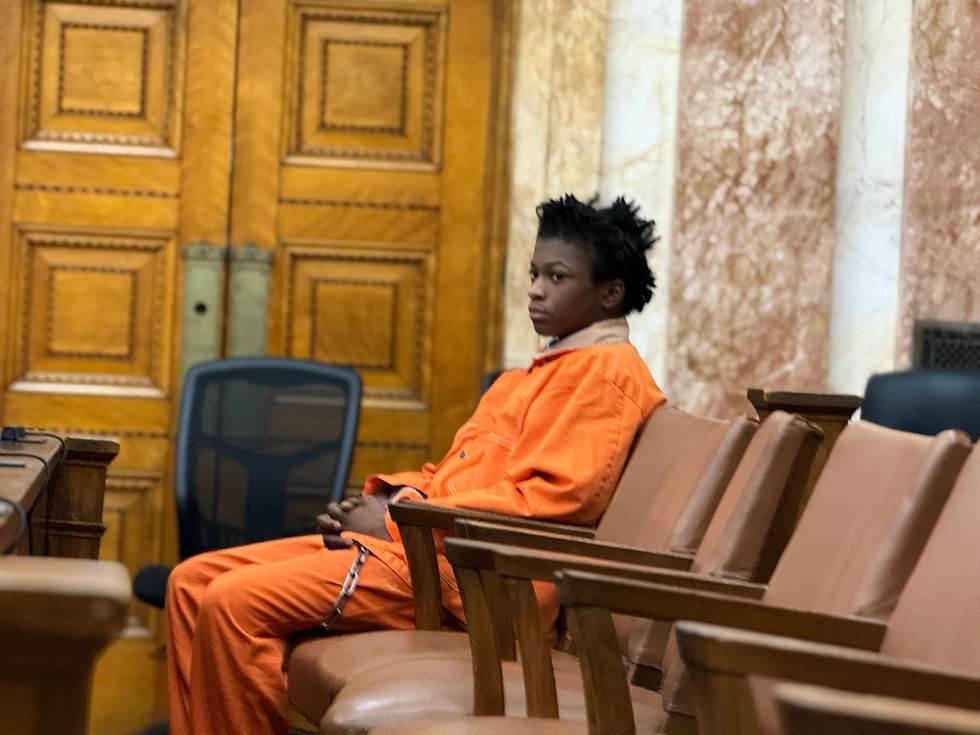'Shredded': toddler's injury was unsurvivable, pathologist says
- Jamie Duffy

- Jun 4, 2025
- 3 min read
ALLEN COUNTY, Ind. --The mesentery, a word you may never have heard, links the bowels to the aorta and blood vessels.
“The lifeblood,” Dr. Scott Wagner said on the stand Wednesday (June 4) at the Felony 1 neglect trial of Michael Allen, Jr. Allen Superior Court Judge Fran Gull is presiding.

Allen, 35, is accused of delivering a blow so hard to his 17-month-old daughter’s abdomen that her mesentery was “shredded,” Wagner said. She died early on Feb. 25, 2021.
The injury to this crucial organ was discovered when Wagner, a forensic pathologist, went deeper into the autopsy conducted a day after she died.
“There was blood gushing out because of the torn mesentery. I wasn’t expecting to see that,” Wagner said.

With such a catastrophic injury, a person could only survive one to two hours, Wagner said.
Children have resilient skin and external bruises can hide serious internal injuries, he said. The autopsy revealed a number of bruises that were more serious than thought.
Dr. Shannon Thompson, a pediatrician and child abuse specialist with the Indiana University School of Medicine and Riley Children’s Health, rejected the idea that overly forceful CPR could have caused the deadly injury. She testified that a torn mesentery in children is rare and accounts for between one and 6% of children’s injuries.
How to explain this devastating injury is at the center of this trial. The night Kaivonni died, Allen was the only caregiver after he dropped off the toddler’s mother, Kayla Vachon, at work around 3 p.m. on Feb. 24.

Through his attorneys, Allen leaned on his claim that the little girl had been vomiting, something he told police officers and detectives during the investigation.
Another theory put forward by his attorneys, Greg Miller and Nicholas Podlaski, was overly forceful chest compressions administered during CPR.
According to court testimony, Allen was rushing his daughter to Lutheran Hospital on West Jefferson Boulevard after he found her unconscious and limp, but diverted to Fort Wayne Fire Station 11 on Rudisill Boulevard. It was much closer from the mobile home he and Vachon shared in the 6000 block of Moeller Road in New Haven.
FWFD medics worked on Kaivonni before she was transported to Lutheran by ambulance. Many medics were involved in trying to breathe life into her.
EMS paramedic Marah Gray and firefighter EMR William D’Alessandro explained on the stand how CPR is administered on a child versus an adult and that it only concerns the upper part of the body.
While Gray described Allen as “distraught,” D’Alessandro said Allen seemed “disconnected, calm and not involved.”
“Traditionally people are rather hysterical” when a child is not breathing and has no pulse, D’Alessandro said.
Fort Wayne officer Michael Carrier, who arrived at the fire station as CPR was in progress, spoke to Allen. Carrier testified that Allen was “shaking, had tears in his eyes and seemed distraught.”
Allen gave him the number to reach Vachon who was stuck at work until her supervisor gave her a ride to the fire station. But Vachon testified Tuesday in court that Allen called her at work around midnight and told her that Kaivonni was dead.
At the fire station, Carrier said he smelled “99” on Allen, FWPD code for narcotics, and when New Haven detective Kevin Hamrick visited the mobile home the next day, he said “there was a strong odor of marijuana in the residence,” and that was “clean and well kept.”
EMS personnel also noted that the victim was “pristine” as if she’d been changed before the ride to the fire station and detectives who visited the mobile home said Kaivonni’s bed was made. Crime scene photos bore that out.
Thursday may be the last day for the trial. The state, represented by Rachel Gschwend and Rebecca Grove, will put New Haven detective Kurtis Jeffers on the stand. Then it’s up to the defense, but currently there’s no indication Allen or anyone else will testify.




Comments